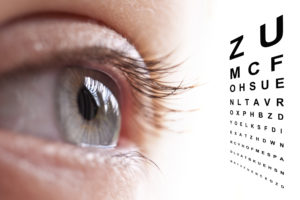
Shocking though it may seem, about one in three people 65 and older have lost some of their vision, often permanently. But age-related vision loss isn’t inevitable: there are ways as you grow older to stop or slow progressive eye conditions before they rob you of your sight.
This month, Hattiesburg Eye Clinic joins other vision care providers across the country to promote Healthy Vision Month. Their message: keeping your sight later in life depends on how you care for it now.
“There are a number of sight-robbing eye diseases that are of greater concern as we age,” says Dr. David Richardson, ophthalmologist and eye surgeon with Hattiesburg Eye Clinic. “The more common are cataracts, glaucoma, age-related macular degeneration and diabetic retinopathy.”
Dr. Richardson notes that, for the most part, these conditions progress slowly over a period of years often without symptoms. When patients do notice symptoms, it often means sight damage has already occurred.
Fortunately, most of these conditions have treatments that can stop or slow their progression. But there’s a catch: Treatment is more effective if a condition is detected in its early stages.
“The best way to catch developing disease is through an annual eye exam beginning for most people around age 40,” says Dr. Richardson. “During an exam we carefully check for signs of disease or the conditions that may precede it. If we can diagnose earlier rather than later, we have a better chance of stopping or limiting any damage.”
Eye exams are even more important when you factor in family history. According to Dr. Richardson, your risk of glaucoma is over four times higher if you have an immediate family member with the disease, and 50% higher for age-related macular degeneration. It’s important, then, to relay this information to your doctor during an exam.
Dr. Richardson says there’s also a secondary benefit to annual exams: detecting other general health problems.
“Just as we consider the eyes to be the ‘windows into the soul,’ they’re also windows into the rest of the body. Eye exams often pick up signs of diabetes, high blood pressure, heart disease or autoimmune disorders the patient often has no idea they have.”
Besides annual exams, Hattiesburg Eye Clinic recommends the following lifestyle changes to minimize eye disease later in life.
Eat “eye-friendly” foods. A low-fat diet rich in whole grains, dark leafy vegetables and cold water fish (like salmon and halibut, rich in Omega 3 fatty acids) are highly nutritional for eye health.
Stop using tobacco. Using tobacco increases the risk for cataracts, macular degeneration, eye diseases influenced by cardiovascular disease and chronic dry eye (from tobacco smoke).
Wear sun protection. Long-term exposure to ultra-violet sunlight increases the severity of cataracts and cancer risk, so wear tinted glasses or sunglasses and shading headwear while outdoors.
Eyesight plays a key role in quality of life at any age, but especially in our later years. Adopting these lifestyle habits, especially annual eye exams, is an investment in healthier vision throughout your lifetime.
For more about maintaining your eye and vision health throughout your life, visit us at HattiesburgEyeClinic.com. To learn more about how Hattiesburg Eye Clinic can improve your vision health, call 601-268-5910 (or toll-free 800-624-8254) or schedule a consultation with us.


